Key Insights
- Employee testimony from YouTube and Alphabet executives does not support claims of Biden administration censorship pressure, contradicting recent legal statements.
- Tech industry leaders are under increasing scrutiny for their content moderation policies and the perceived influence of government during the COVID-19 pandemic.
- Ongoing debates highlight the complexity of balancing misinformation control and free speech across major digital platforms.
A heated debate has emerged over how much the Biden administration influenced YouTube’s content moderation. Alphabet’s legal counsel claims the government pressured the platform to take tougher action against COVID-19 misinformation. However, testimony from over twenty YouTube employees in Congress suggests otherwise — they say most moderation decisions came from YouTube’s own internal policies, not outside pressure.
Employee Testimony Challenges Biden’s Government Pressure Narrative
The controversy reached a peak when Alphabet, YouTube’s parent company, sent a letter to the House Judiciary Committee suggesting its COVID-era moderation policies were shaped by pressure from the Biden administration. Republicans seized on this as evidence of Democratic censorship. However, a subsequent letter from House Judiciary Committee ranking member Jamie Raskin cited extensive transcripts from interviews with 20 Alphabet employees. These employees, spanning policy, health, and trust & safety roles, uniformly stated that they were not pressured by the administration to suppress or remove content. Raskin asked pointedly whether Alphabet was now claiming all these witnesses lied, or if the company’s unsworn letter was meant to placate political demands.
Tech Company Moderation: Internal Policy vs. External Influence
The broader tech industry has faced a tumultuous year, with firms like Apple, Meta, and Google navigating accusations of government interference and political bias. In recent Senate hearings, executives from Google and Meta confirmed they felt pressure from the Biden administration to take down specific COVID-19 and election-related posts. Yet, Google’s representative asserted that their decisions were made independently and that YouTube did not cave to external pressure, often refusing government requests.
This tension between perceived influence and declared autonomy is central to the ongoing debate about how social platforms shape public discourse.
- Meta executives admitted regret over some decisions made under government pressure.
- Google maintained it frequently rejected requests and banned users based on its own guidelines.
Restoring Banned Accounts and the Path Forward
As scrutiny intensifies, YouTube announced plans to reinstate accounts previously banned for political speech, including high-profile figures. This move follows years of controversy and reflects shifting attitudes toward content moderation and free expression. The announcement, described in a submission to the House Judiciary Committee, acknowledges that government pressure played a role in past decisions—but stops short of confirming direct coercion. The restoration could impact both regular users and notable personalities, reigniting debates over platform neutrality and transparency.
Industry experts and lawmakers continue to demand greater transparency from tech giants. Proposed legislation seeks to require disclosure when government entities pressure social media companies, aiming to clarify the boundaries between content moderation and censorship. As the digital landscape evolves, the challenge remains: how to protect users from misinformation while safeguarding free speech and resisting undue political influence.
Discover more from WireUnwired Research
Subscribe to get the latest posts sent to your email.




